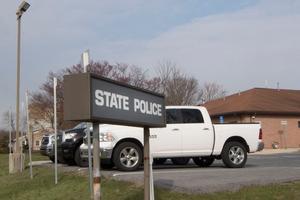Spotlight PA is an independent, nonpartisan newsroom powered by The Philadelphia Inquirer in partnership with PennLive/The Patriot-News, TribLIVE/Pittsburgh Tribune-Review, and WITF Public Media. Sign up for our free newsletters.
HARRISBURG — Pennsylvania State Police troopers who kill or injure someone should not be investigated by their own agency, and an independent prosecutor should review the case, according to a recommendation approved Friday by a state oversight panel.
The proposed reform comes after a joint investigation by Spotlight PA and NBC News highlighting the nearly unchecked power of local district attorneys in Pennsylvania to decide whether or not to bring charges against police, despite the fact that those prosecutors work closely with the officers they oversee.
The State Law Enforcement Citizen Advisory Commission, which was created by Gov. Tom Wolf after the murder of George Floyd, made the recommendation based upon its review of a 2016 incident in Beaver County in which troopers consulted with the county district attorney before shooting a suspect involved in an hours-long standoff.
That same prosecutor then later reviewed the case and ruled the shooting was justified.
The commission, which has oversight of the State Police and other law enforcement agencies under the governor’s jurisdiction, said the measures are designed to restore the community’s trust in police.
Kelley Hodge, a commissioner and former Philadelphia district attorney, pointed out that the commission found the State Police acted quickly and fairly in its investigation of the case but that “there was an inherent suspicion … or conflict of interest that could arise” based on the circumstances of the case.
Elizabeth Pittinger, a commission member and long-time police oversight advocate, said the incident was disturbing and the actions of the prosecutor “almost approaching arrogant.”
“They get the green light to do whatever, even though there were hours that had elapsed,” she said of the State Police. “It raises so, so many issues.”
A State Police spokesperson told Spotlight PA the agency believes troopers followed state law in 2016.
While the subcommittee that presented the recommendation found the investigation of the shooting and review by Beaver County District Attorney David Lozier were impartial, commissioner Spero Lappas, an attorney in Harrisburg, said he disagreed with that finding.
“There is at least the appearance of a conflict of interest when Pennsylvania State Police review and investigate their fellow members,” he said.
He also pointed out that the State Police have refused to provide the commission internal statistics that show how often internal reviews result in findings that the troopers acted appropriately.
“I believe it is relevant,” he said.
If, he said, the data shows that State Police rule that troopers acted correctly in the vast majority of cases, that would be an indication of partiality.
The guidance follows calls from the parents of Christian Hall, a 19-year-old Chinese American killed by the State Police, for their son’s death to be independently investigated.
Video obtained by Spotlight PA and NBC News shows that Hall had his hands in the air when troopers shot and killed him near Stroudsburg in December 2020. The shooting was investigated by the State Police and ruled justified by the Monroe County district attorney, who works closely with the agency.
Neighboring states have adopted similar strategies to remove police and prosecutors from investigating use-of-force incidents in recent years.
In New Jersey, the attorney general’s office in 2019 established a public integrity and accountability office, which is responsible for selecting independent investigators, or performing investigations itself, into incidents involving deadly force or serious injury.
In Delaware, the state Division of Civil Rights and Public Trust investigates use-of-force incidents by police.
And the Maryland state legislature this year passed sweeping police reforms that include tasking a division of the state attorney general’s office with investigating all fatalities involving police officers.
The recommendations are significant but the degree to which the State Police and other agencies will cooperate and what happens next is unclear.
Wolf’s executive order creating the commission states that it will prepare a report of its findings on the cases it reviews and include recommendations that are approved by the full panel.
Then state agencies under its jurisdiction, such as the State Police, “will review the recommendations and provide the commission with responses and updates regarding implementation of recommendations, as appropriate,” the order states.
A spokesperson for State Police, Cpl. Brent Miller, said the agency will take this and other recommendations put forth by the commission “under advisement.” Miller said State Police helped train commission members to make meaningful recommendations.
“PSP appreciates the dedication and time these citizens have volunteered to improving public safety and fair treatment, and addressing inequities in law enforcement,” he wrote by email.
The State Police could agree to change its policies and not investigate incidents involving troopers, but that would require determining who else would do it. Removing local district attorneys from overseeing fatal State Police killings in their jurisdiction would likely take legislation, such as a bill proposed by Sen. Art Haywood (D., Montgomery), which would give the state attorney general the power.
Currently, the attorney general can only intervene at the request of a local district attorney.
Correction: This story has been updated to correct the spelling of Kelley Hodge’s first name.
WHILE YOU’RE HERE… If you learned something from this story, pay it forward and become a member of Spotlight PA so someone else can in the future at spotlightpa.org/donate. Spotlight PA is funded by foundations and readers like you who are committed to accountability journalism that gets results.
